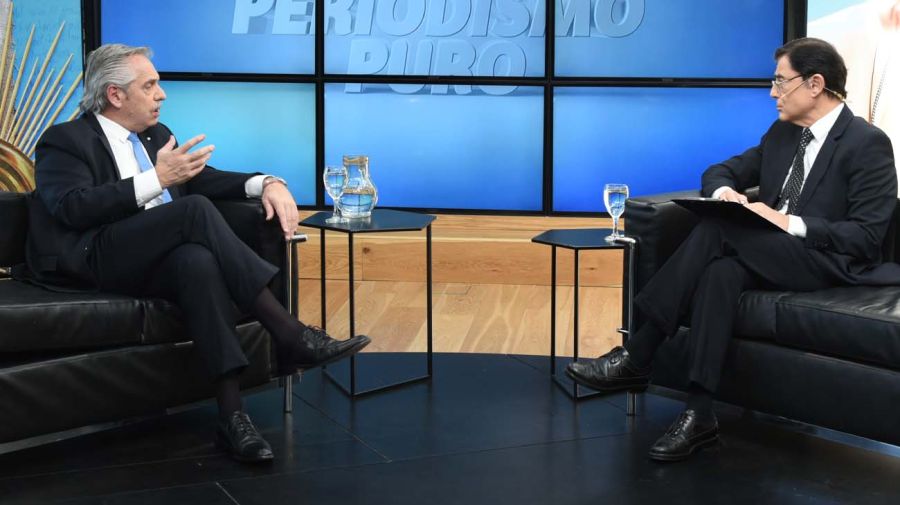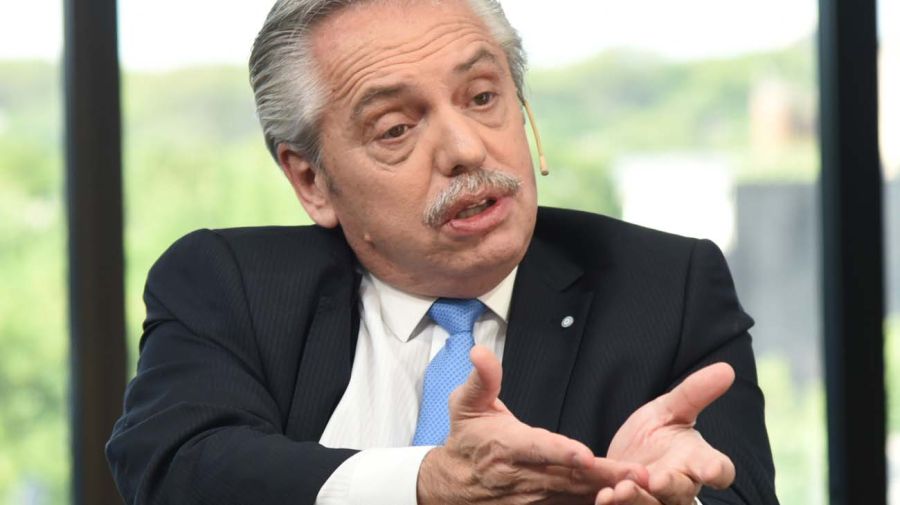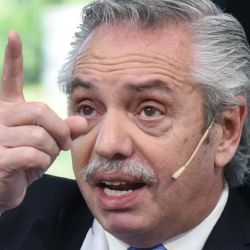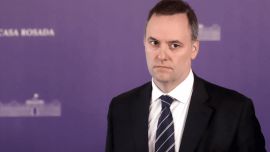In the midst of the presidential transition, which for now seems one of the most orderly in the last 40 years, and just days after the first meeting between the outgoing head of state and his successor for the next four years, President Alberto Fernández sits down for an extended interview of potential historic value.
Fernández, 64, reflects on the difficult times which it befell on him to govern during – from the start with the pandemic, along with renegotiating an unpayable debt to the International Monetary Fund followed by a war in Europe affecting the global economy and imposing a reordering of geopolitics, in tandem with the worst drought in the last 100 years. All this, aside from the internal bickering of the ruling coalition, resulted in a practically trebled inflation, rising poverty and (what amounts to the biggest failure for a Peronist government) the failure of Argentine wages to recover and a feeling of social fatigue and discontent.
These feelings translated into the election of the most disruptive president in Argentine history, Javier Milei, a radical change in the model of the country and an uncertainty which has society on tenterhooks.
President, let’s start by drawing a balance of your almost four years in office. What do you consider to have been your biggest mistakes and what would you have done differently in hindsight?
That is a very complex question because I committed many errors for sure but always honest mistakes.
As an admirer of [1983-9 Radical president Raúl] Alfonsín, you obviously recall that phrase: “What I did not wish to, what I could not and what I did not know how [to do].” How would you answer that for yourself?
I didn’t do anything I didn’t want to do. I do not repent of anything I did, I did it all with absolute conviction.
What you could not do?
What I could not do was due to being unable to end that damned grieta chasm dividing Argentines which is permanently fuelled by Argentine political sectors and which is now deeper than ever. And I regret that so much because no country can grow with all sides pulling it apart, that’s very difficult.
And what would you have liked to know how to do which you didn’t? Now knowing how things turned out, what would you have done differently?
I wouldn’t have done anything differently because I did everything fully aware, highly convinced and absolutely certain that I was on the right road so I have nothing to regret. Now I would have liked many of the things happening to us never to have happened – for the pandemic never to have existed, not to have been obliged to negotiate US$100 billion of debt with private creditors and US$45 billion with the International Monetary Fund, not to have to endure a war costing us US$5 billion in gas imports and being the president to suffer the worst drought in the last 100 years. I faced up to each one of those problems and I do not believe the results to be as negative as many would like to make out … What I can guarantee is that I put all my energy into those four years, sacrificing my health, and I leave office with less than when I entered because I had to eat into my personal savings. And I leave office with the inner calm that my government was the one which carried out most public works in Argentina without a single charge of corruption.
When you list the pandemic, the war in Ukraine and the worst drought in history, it should be asked what each one of the preceding presidents would have done in each of those situations. Again with hindsight do you feel that any of them would have done a better job if faced with the same situations?
I’m not so arrogant as to say that what I did was the best which could be done but I can tell you that when the pandemic broke out, my predecessor recommended to me that I follow the logic of herd immunity, allowing the contagion to spread with those who had to die dying off because it was inevitable but not to halt the economy. And my response was that I can in time bring about economic recovery from the losses of the moment but what I cannot bring back are lives. The pandemic has two basic numbers, of which only one has remained in the collective memory. The first number is that during the pandemic, 11 million Argentines were infected, of whom 130,000 died - i.e. 10.87 million people were cured in Argentina thanks to public health. Over 130 million doses were vaccinated in Argentina, which today has its own vaccine. Among the countries with over 30 million inhabitants, Argentina is the most immunised against Covid-19 – that is the bottom line.
It should be borne in mind that all this happened in a scenario where public health had been dismantled with public hospitals and the Health Ministry closed down and all the funding taken out of public health. In that scenario I had to take charge of everything, I had to build almost 40 modular hospitals nationwide to attend to patients while installing 4,000 artificial respirators and over 4,000 beds in intensive care wards nationwide to face the pandemic. When I came into office, as you will remember, anybody infected in Tierra del Fuego had to come to Buenos Aires for their nasal swabs so that the Instituto Malbrán could determine via genetic sequencing whether they were infected or not since there was only one unit of apparatus in the whole country permitting detection of the virus. I made sure that today there is one in every province but that is everything which happened. Who could have done things better? I don’t know but what I am sure of is that we did everything we had to do and came out of it pretty well.
You are now obviously marking an emotional moment which will be remembered for the next 100 years, which has to do with the pandemic. For example, did you feel that it was union pressure which prevented you from opening the schools any sooner as you might have liked?
The schools did not open as soon as I would have liked because the recommendation of the World Health Organisation said not [to]. I’m not a doctor, I’m a lawyer with little knowledge of infectology so I tried to be advised by the best and I’m sure I was. And I shall remember that group of infectiologists who helped me at that time with lifelong gratitude, as Argentina should remember them too.
Upon review, it started with a discussion over whether face-masks made sense or not and then whether the vaccines were Communist or capitalist. If we were not buying the vaccine from the United States, that was because we wanted to reach an agreement with Chinese and Russian Communism.
For example, buying the Pfizer vaccine earlier.
Because the conditions which Pfizer placed in their contract were absolutely inadmissible and when Pfizer changed the conditions, we bought it ... the immunity requested by Pfizer was extraordinary, inadmissible, a concession of sovereignty which I did not want to accept. And when Pfizer accepted that, we signed the contract.
You took office with a phrase which was a definition or promise of your government: “We’ve come back better.” Now that you’re leaving office, were you better?
I’m convinced that we were better because our government is leaving without a single denunciation of corruption, having faced up to all our problems and making Argentina grow 16 points in two years after falling nine points in the pandemic. And in the first eight months of this year, with all the drought and the lack of dollars we had, we’ve succeeded in setting records of industrial production with 37 consecutive months of registered job creation after having created nearly 1.5 million new jobs for people who in 2019 were in the street.
But also after having doubled inflation in the past two years.
One detail I always highlight. There is indeed inflation in Argentina reaching very high levels but it did not start from zero, we began with 54 percent. Looking around the globe, inflation has been worldwide. When anybody asks why, there are two answers. Firstly, a whole lot of money was printed during the pandemic in order to try and make it through. As also did Argentina but in worse conditions because it had to print the equivalent of almost seven points of gross domestic product without a cent of credit as [Maurici] Macri reminded us at the time. And looking around the world the most developed countries were multiplying their money supply sixfold or tenfold.
But later lowered it again.
Yes, but not to zero. First they multiplied [the money supply] sixfold, ten fold or 11 times and then lowered it a few points. We doubled ours or trebled it in the worst of cases but our starting-point was 54 percent [inflation]. That’s why I’m saying that there are two ways of reading this. Not that I’m justifying in any way having 130 to 140 percent [inflation] or saying it is reasonable, clearly not. But it was a worldwide phenomenon linked to the money being printed during the pandemic and the increased food and energy prices due to the war between Ukraine and Russia while Argentina also lacks dollars.
Let’s move on to the chapter of the elections, you were wondering: “But how did we lose the election when we have done all this?” On the Friday before the run-off weekend, did you believe that Sergio Massa could win?
Yes.
And what emotions did you feel when Sunday brought its unexpected surprise?
I felt a great chagrin. Besides, Sergio put in an enormous effort and ran a great campaign. My regrets for all of us but in particular for him, for all the effort he put into the campaign.
Could an economy minister who had to administer 130 percent inflation be a good candidate? Wasn’t there an intrinsic problem a priori?
It was a risk but he was a very good candidate.
Why did Martín Guzmán have to go [from the Economy Ministry]? Did that have to do with friendly fire?
I understand that he left because he realised that he could not continue suffering the onslaughts from inside [our coalition].

Just as many analysts consider it a masterstroke of Cristina to have named you presidential candidate with herself as your running-mate when you had been the most ostensible critic of her government, do you also think Macri made a similar chess move in finally supporting [Javier] Milei?
That is difficult to analyse because Cristina and I, over and above all the criticisms, have a sort of common denominator of beliefs as to what politics should be.
Will Macri have such a common denominator with Milei?
If Macri is a libertarian extremist, that would surprise me. To my mind he’s a businessman who seeks state power on behalf of continuing his private business.
Would Milei be functional for that?
Perhaps. What he needs is to return to power to continue doing business, as he did throughout his government.
You said that it never passed through your head to resign in these last four years. Did you think at any time that it might have been an error to have accepted Cristina Fernández de Kirchner’s proposal to head the presidential ticket?
I would like everything to have been otherwise but that’s the way it was. I’ve been in politics since I was 14, in politics you cannot choose your scenario nor your competitors.
Nor your allies?
That’s the hand you’re dealt and it is what it is. At that time Peronism was very divided and I had begun to work towards unifying it long before Cristina. I was telling everybody that I had to join up with Cristina even when I was distanced from her because denying that Cristina represents a part of Peronism is daft, as is denying that Cristina is part of history. Whether she is stronger or weaker than before is debatable, each person can draw their own conclusions, but to say that Cristina does not exist is daft - daft then and daft now.
What did you feel when you heard the Vice-President say while voting in the first round: “This was not my government”?
I did not understand that because afterwards she behaved as if it were her government. But aside from that, she said: “I don’t feel part of the government because nobody listened to me,” which is not correct because she was always listened to – in private, in her tweets, in her lectures which she calls master classes and in her open public letters. What is true is that I never shared those ideas so if she wants to accuse me of being disobedient, I can understand that. But if she wants to accuse me of not listening to her, no, not that.
How long is it since you last spoke with her?
A long time.
Mr. President, in that dialogue with Roberto Navarro attributed to you, did you really say that you might be the person who could put an end to Kirchnerism?
No. That was the product of a chat where I proposed that after 20 years we needed to review a few things. Axel [Kicillof] is saying much the same when he says we need to play some new melodies. And that was converted into me saying that I wanted to put an end to Kirchnerism. I don’t want to put an end to anybody, I want to add everybody but I want us all to respect each other so that we may be primus inter pares because I have no bosses.
You said in one of those interviews that you had gotten to know Milei before becoming president. When and how did you get to know him? Did you see him again after the first encounter before that meeting you had a few days ago?
I got to know him on a programme of [the late] Mauro Viale when I was winding up an interview and Mauro Viale said to me: “Now we’re going to talk to Javier Milei. Do you know him?” I’ve seen him on television, I replied. “And what do you think of him?” To which I replied: “The truth is that I don’t share many of his ideas, he’s a liberal and I’m not but that’s his opinion.” So Mauro Viale asked him: “And what do you think of Alberto Fernández?” And he said: “I see him as a complete man respectful of democracy and I thank him warmly for recognising me as a liberal because many who call themselves liberals aren’t really.”
A week later Guillermo Nielsen, who was working with him in Corporación América, called me up and told me that Milei wanted to get to know me so we got to know each other over a lunch, where he talked a lot about his dogs and his relationship with his parents but also about economics where we could spot the differences. And afterwards, when I was already president, he contacted me at times via WhatsApp giving me his opinions, which I read without answering, I must confess. That’s how I got to know him, such was my link with him.
Did you see him again before your latest meeting?
I saw him at that meeting, which I proposed to discuss the transition.
Is it true that at that Olivos meeting, he almost burst into tears when he saw your dog and it was he who asked to get to know him?
He did indeed ask if he could get to know Dylan, I brought him and he was very affectionate, I would almost say amorous, with Dylan but I have nothing to say in that respect except to thank him for liking Dylan.

Over and above any value judgments about the convenience of Milei’s economic ideas, do you consider that his economic plan can be put into practice, given his lack of Congress majorities and pushback from those affected in the form of street protests, for example?
The impression I have is a common denominator with Carlos Menem, that’s what I feel. Menem understood in his time that to resolve the problem of inflation, you had to reduce the fiscal deficit with maximum austerity and when that did not suffice, you had to auction off ‘Granny’s jewels’ [state assets], as we called them back then.
The privatisations?
Exactly the same logic. What makes an impression on me is that he is seeking to repeat that same logic and the policies of convertibility, which is now called dollarisation in his latest version, because that logic destroyed the Argentine economy and national industry, leaving 18 percent unemployed. The truth is that it did not leave a good result.
You are answering me specifically about what I did not ask you, you’re talking to me about the consequences.
You mean you’re asking about the possibility of putting it through?
Exactly because Menem had both houses of Congress in his favour and 80 percent of the governors, plus living in the era of Ronald Reagan and Margaret Thatcher after the Berlin Wall had come down. Today’s context is totally different.
In the chat we had I pointed out to him that all those decisions required the participation of Congress and that I presumed that it would trigger a very heated, tough and difficult debate and that he should measure all that politically.
What advice would you give Milei?
That he should give Macri as wide a berth as possible.
What do you believe Macri’s intentions to be?
To go on doing business. That’s why he wanted to be president, to do business with wind farms, highway tolls and the Post Office. That’s why he wanted to be president, to spy on his own people to try keeping them under control and seeing whether they had any undeclared businesses.
In the conversation you had with Milei, what advice did you give him regarding BRICS and the relationships with China and Brazil or breaking up Mercosur?
The truth is that I dedicated a great deal of time to him and I have to say that I found him attentive, I don’t know if receptive, but attentive to what I was saying. I don’t want to be unfair, I had a correct and respectful meeting with Milei despite our not thinking alike. Now what I tried to transmit to him was my experience.
He can take it or leave it, I don’t know, but what I see happening in the world is a diametrical change in geopolitics and not admitting or noticing that is a monumental error. We are living in the close of United States hegemony with Europe in profound crisis beginning with Brexit and deepening with the war between Russia and Ukraine and the emergence of the two commercial powers China and India united in BRICS [from the initials of Brazil, Russia, India, China and South Africa and now adding five other countries, including Argentina]. Now being part of BRICS is being part of 44 percent of world population and part of 36 percent of global production. Today BRICS are more important and more representative than the G7.
Over and above the reduced US hegemony, Milei always praises Donald Trump. Given Milei’s preference for the Republican Party while the Joe Biden administration responds to the Democratic Party, do you think he could even trigger a certain tension with the United States?
I must confess that some commentaries he made to me demonstrated a certain prudence and caution on that front. Trump represents much more in the world than in the United States. Trump was a tragedy for the European Union, for China, for Russia and for Latin America.
You mentioned a certain worry from a discussion of human rights and gender diversity, both from Javier Milei but essentially the [future] vice-president Victoria Villarruel. Do you have fears for the quality of life for your [elder] son Tani under a government with Milei’s ideas?
Definitely yes, for Tani or for any person who is part of gender diversity, Of course I’m afraid because there is an aggressive discourse towards those communities…
Towards minorities.
And you need to see how some violent people decode that discourse. I pointed that out to Milei, somebody decoded your discourse and put a pistol to Cristina [Fernández de] Kirchner’s head.
And how did he react?
He said that he is alien to all that and I believe he is.
I understand that you did not tell him that he had done it on purpose but that he had contributed...
No, I drew his attention, he listened to me and I told him in particular about my son and how worried I was by that homophobic discourse. Of course it worries me because one of the great advances in Argentina, from the gay marriage law onwards, is understanding that we are all equal and we all have the same freedom so if we all stay in the place and lifestyle where we feel most comfortable, none of us are the ones to tell others how they should be…
Of course it worries me and of course I’m going to be on the side of all those minorities and place myself at their head if necessary. And I’m going to share the struggle of women to keep claiming equality because I don’t want to backtrack on that in the slightest. And it worries me because among those [Milei’s] people there is some very emphatic discourse marking out the things which worry me so much.
That photo of your wife’s Olivos birthday party, did it have personal consequences for your relationship? There are rumours that you are separating...
That has not happened and is not going to happen. What is true is that it did have consequences because the level of aggression against Fabiola has been immense. And when I tried to explain what had happened, the media said that I had blamed Fabiola for it. The last person guilty is Fabiola, she had nothing to do with it. The responsibility is 100 percent mine and we suffered it because it should be understood that we political families, like the threats against the Massa family, live permanently threatened via the social networks, email or WhatsApp. It happened to me two or three times while president and while travelling by helicopter from the Casa Rosada to Olivos, that telescopic sights aimed at me appeared in the helicopter.
How’s that?
With a laser ray which somebody with some firearm was focussing on me in the helicopter. I don’t believe they intended to shoot at the helicopter although I don’t know. What they did want was to send me the message that there were telescopic sights trained on the helicopter. It didn’t happen to me just once but two, three or four times and my bodyguards saw it too. We kept quiet because we said: “Let’s not make a problem out of this.”
Before the attempt on the vice-president’s life?
Afterwards.
Wow... Last question. They say that the two happiest days of a president are when he is elected and when he concludes his term, feeling relief from the tensions and responsibility of that post. Are you beginning to feel that relief?
No, because I would like to have left an Argentina... I believe that I succeeded in putting Argentina back on its feet and walking again but I would like to have left a healthier economy with less inflation. I believe that we have a vigorous economy but it’s sick with inflation and that does not make me happy because inflation is affecting people’s pockets.
I had many joyful days when I was president, with my inauguration one of them. We celebrated one December 10 [Human Rights Day] with [former Uruguayan president José] ‘Pepe’ Mujica, [Brazil’s Luiz Inácio] Lula [da Silva] and Cristina in the Plaza de Mayo – that was a happy day for me. The day the first aeroplane carrying vaccines arrived was a happy day for me. As a football fan, winning the Copa América, the World Cup, the Copa Finalísima and ending Brazil’s unbeaten streak in World Cup qualifiers in the Maracaná [stadium] during my government were happy days. Some five million people taking to the streets of this city to celebrate the World Cup triumph was a happy day for my government. Entering BRICS was a happy day for my government. As a defender of human rights, getting UNESCO to recognise the former ESMA [Navy Mechanics School concentration camp] as a world heritage site was a happy day for my government. Bringing back the aeroplane which tossed nuns and mothers into the river was a happy day because we recovered our memory and again made the horror tangible. We had many moments of personal joy.
Production: Melody Acosta Rizza & Sol Bacigalupo.
Editor’s note – this interview has been edited for clarity and length.























Comments